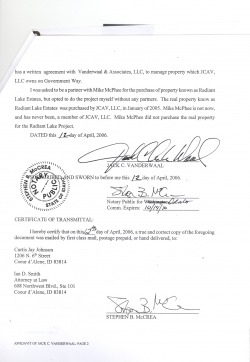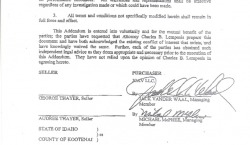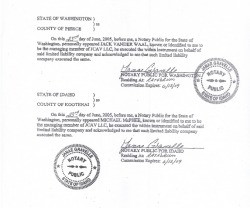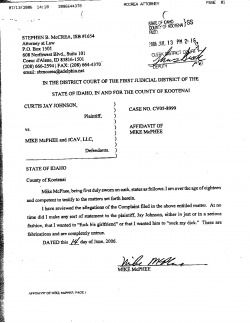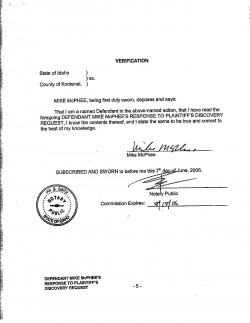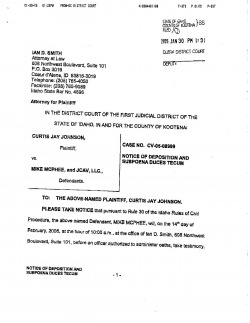This page is a collection of pictures and documents illustrating the story. Scroll down to review them all, click the picture to see and enlarged version. Clicking "back" on your browser, even after enlarging a photo, takes you back to the story. This page can only be accessed by clicking a link in the story. Sorry for any inconvenience.
Vanderwaal testified in response to my interrogatories, that McPhee signed a real estate listing contract on JCAV's behalf, and that McPhee sent several letters through attorney Stephen McCrae to myself, demanding release of earnest money and threatening a lawsuit against myself and GMAC Real Estate. Real estate contracts negotiated and signed by McPhee on JCAV's behalf were in evidence. McPhee and JCAV denied they were principal and agent. They spent page after page denying it, and the judge said, exactly, at the hearing:
"Mr. Johnson contends that Mr. McPhee was an agent of JCAV, and there really is nothing more than a mere scintilla of evidence of that fact. That's not been established from the record.
Mr. Vanderwaal's affidavit and certainly the record indicates that at the time of the transaction involved that there was no agency relationship."
The judge is defending a known perjurer's affidavit, at a hearing where he is required by law to construe the evidence in a light most favorable to me, the non-moving party. It was a hearing on the defendants' motion for summary judgment. He is also completely ignoring the record, turning a blind eye, to help his buddy and former partner and to maintain the appearance lawyers are smarter and better than everybody else.
At the time of the transaction, they were partners, saying so in front of a notary is called an extrajudicial admission. JCAV completely withdrew their argument that McPhee wasn't JCAV agent on appeal, because it was so absurd. But generally, the degree of absurdity in ALL the defendants' arguments was STAGGERING and so was the legal systems acquiesence in allowing those arguments to stand.
"Mr. Johnson contends that Mr. McPhee was an agent of JCAV, and there really is nothing more than a mere scintilla of evidence of that fact. That's not been established from the record.
Mr. Vanderwaal's affidavit and certainly the record indicates that at the time of the transaction involved that there was no agency relationship."
The judge is defending a known perjurer's affidavit, at a hearing where he is required by law to construe the evidence in a light most favorable to me, the non-moving party. It was a hearing on the defendants' motion for summary judgment. He is also completely ignoring the record, turning a blind eye, to help his buddy and former partner and to maintain the appearance lawyers are smarter and better than everybody else.
At the time of the transaction, they were partners, saying so in front of a notary is called an extrajudicial admission. JCAV completely withdrew their argument that McPhee wasn't JCAV agent on appeal, because it was so absurd. But generally, the degree of absurdity in ALL the defendants' arguments was STAGGERING and so was the legal systems acquiesence in allowing those arguments to stand.
Here McPhee swears that he never told me to suck his dick or that he was going to screw my girlfriend, "these are fabrications and completely untrue."
They argued that even if it was true, it was just locker room talk, and certainly not extreme and outrageous conduct as required under the law for intentional infliciton of emotional distress. OK. So if it was just locker room talk, WHY, with his attorney present, did McPhee lie about it under OATH? The judges and stuff just don't care, they're too lazy to even ponder for a moment. If it was locker room talk, McPhee committed perjury, again. If it was psycho torture that crippled me, it was extreme and outrageous conduct, actionable. The judge has to discern this stuff, and he's required by law to consider the evidence in a light most favorable to me at a motion for summary judgment against me. Every single argument on every single aspect of this case was EQUALLY ridiculously ruled upon by not only the local judge, but the Court of Appeals, and then the Supreme Court refused to review the case.
They argued that even if it was true, it was just locker room talk, and certainly not extreme and outrageous conduct as required under the law for intentional infliciton of emotional distress. OK. So if it was just locker room talk, WHY, with his attorney present, did McPhee lie about it under OATH? The judges and stuff just don't care, they're too lazy to even ponder for a moment. If it was locker room talk, McPhee committed perjury, again. If it was psycho torture that crippled me, it was extreme and outrageous conduct, actionable. The judge has to discern this stuff, and he's required by law to consider the evidence in a light most favorable to me at a motion for summary judgment against me. Every single argument on every single aspect of this case was EQUALLY ridiculously ruled upon by not only the local judge, but the Court of Appeals, and then the Supreme Court refused to review the case.
Here is McPhee's signature on June 7th, 2006, after his attorney said at a hearing on June 5th 2006, "McPhee will be in my office tomorrow (6/6/6) to answer Mr. Johnson's interrogatories." (That's about what he said, I don't have the transcript.)
Here is McPhee's notice that they are going to depose me on Valentine's Day.
What's maybe hard for people to believe, is that my case was real, the evidence was SOLID.
The defense arguments were RIDICULOUS.
The law was CLEAR.
But the system was stubborn and stupid and heartless and hateful.
They didn't want to know and they didn't care.
Below is a sample of my legal work.
What's maybe hard for people to believe, is that my case was real, the evidence was SOLID.
The defense arguments were RIDICULOUS.
The law was CLEAR.
But the system was stubborn and stupid and heartless and hateful.
They didn't want to know and they didn't care.
Below is a sample of my legal work.
Appellant's Brief on Petition for Review
IN THE SUPREME COURT OF THE STATE OF IDAHO
Curtis "Jay" Johnson )
)
)
) DOCKET #33966
Appellant, )
vs. ) DISTRICT COURT # 1
Mike McPhee ) Appellant’s Brief on
JCAV, LLC ) Petition for Review
Respondents ) by the Supreme Court
NOW COMES the above named Appellant, Curtis Jay Johnson, pursuant to I.A.R. 118
and files the following brief in support his Petition to the Supreme Court to review the
Opinion No. 25 filed April 8, 2009 by the Idaho Court of Appeals.
Breach of Contract
The ruling states "Johnson’s claim that he was a nonagent cannot overcome the fact that his alleged contract was for what amounted to agency representation." In fact, the alleged contract was a "customer services agreement" between a "customer" and a brokerage. I.C. 54-2083 (7) and (8).
The ruling states "Unfortunately the statutes lack clarity in defining what types of services could fall within such such a nonagency brokerage relationship or customer agreement." The services a licensed real estate agent performs are set out in I.C. 54-2004 (29) and (30), and are the same regardless whether an agency representation agreement is executed.
Agency or nonagency status defines duties owed, not services performed I.C. 54- 2086 and 2087. An agency representation contract was not required, and performing the services does not amount to agency representation. The ruling was error.
The ruling states that Section 9-504 has no application to the statutes in Title 54, Chapter 20 and "doubts" that the common law doctrine exempting partially performed contracts from a statute of frauds alters the operation of a comprehensive statutory regulatory scheme like that found in Title 54, Chapter 20.
I.C. Section 9-503 States: "No estate or interest in real property, other than for leases for a term not exceeding one (1) year, nor any trust or power over or concerning it, or in any manner relating thereto, can be created, granted, assigned, surrendered, or declared, otherwise than by operation of law, or a conveyance or other instrument in writing, subscribed by the party creating, granting, assigning, surrendering or declaring the same, or by his lawful agent thereunto authorized by writing."
A real estate brokerage commission/compensation agreement is intrinsically related to the transfer of interest in real property. Compensation is based upon the transfer, and payment is made only if the transfer is executed. The requirement of a writing in a real estate commission agreement is directly due to its being related to the transfer of interest in real property.
The ruling states that "part performance takes a contract out of the statute of frauds only if the claimant’s performance is attributable solely to the existence of the alleged oral agreement."
The elements of equitable estoppel may be satisfied in a statute of frauds case when one party orally has made a false promise and the promisee has relied specifically upon it, changing position to his or her detriment. Frantz v. Parke, 111 Idaho 1005, 729 P.2d 1068 (Ct. App. 1986)
Johnson alleges McPhee made an oral contract to pay Johnson if the landowners didn’t. Johnson relied on the false promise and changed his position to his detriment, by choosing parcels that were not listed for sale, where no compensation was offered by the seller, solely because McPhee promised to pay Johnson if the landowners didn’t.
Statute of Limitation
The stated "there was a distinct and substantial interruption of the alleged tortious activity".
Johnson alleged teasing snickers, slithery touching, mind control, undue influence, i.e. refusing to sign a contract, forcing Johnson to accept payment under the table, not through a broker. All of this conduct occurred between late 2003 and early 2005, so there was no distinct and no substantial interruption. This conduct is continued torturous domination of a mentally emotionally financially crippled man, by the man who crippled him. The conduct occurred in a continuum that started when McPhee and Johnson became close friends doing fabulous business together. McPhee then shockingly directed Johnson to perform oral sex action, licked his lips, etc. Once the psycho-sexual mind torture made Johnson a mental vegetable, from late 2003 to early 2005, teasing snickers were all it took to further torture him, to further assert heinous cruel domination. The continuum time line occurs within an easily defined context, the progress of the Radiant Lake Estates project. There was no break in the domination, and no break in the relationship, and no break in the context. The District Court and the Court of Appeals have in affect stricken significant uncontested evidence and allegations by referencing only the pleadings in finding a distinct interruption in the conduct. The pleadings are meant to be a general laying out of the causes of action and remedies sought, not a complete list of allegations.
The ruling stated that "while these alleged promises might reasonably have dissuaded Johnson from filing an action for breach of contract, they include nothing that would have reasonably caused him to believe that he need not file a timely action on his emotional distress claims."
Johnson was mentally crippled, a deranged, ostracized, slandered beggar, due to McPhee’s conduct. This incapacitated him. He was disabled. McPhee’s promises of payment were all Johnson had to keep him alive, to stave off eviction. In evidence are statements by McPhee that the part payments were a gift, and that he didn’t feel he had to pay Johnson at all. Certainly filing suit for emotional distress claims, if Johnson were able, would have ended Johnson’s chances for getting paid. And so, the promises to pay Johnson caused him to refrain from prosecuting an action for emotional distress during the limitation period.
Outrageousness of the Alleged Conduct
The ruling stated that "Johnson complains… of a confrontation in July 2006." This occurred well after the complaint was filed and is not included in any cause of action and its inclusion in the ruling as a "complaint" is uncalled-for, and seems calculated to diminish the gravity of the situation.
The ruling stated that "Johnson’s allegations concerning McPhee’s insults do not sustain an action for intentional infliction of emotional distress."
Referring to McPhee’s conduct as insults seems calculated to diminish the gravity of the situation. Mcphee’s violently shocking psycho-sexual mind torture, rage, hate, and other heinous psychological domination techniques crippled Johnson, to the point where he was deranged and ostracized as a many flavored sex offender. McPhee knew well that Johnson was crippled, called him a deranged motherf*, and said "Nobody will believe you, you’re crazy." This is undisputed evidence. McPhee refused to sign a contract, forcing a crippled beggar facing eviction to get paid under the table, after promising "you can count on us." He taunted Johnson, a beggar, about money in two voice mails; "I need to borrow some money. You never loaned me a nickel. You f* pr*. Give me a call." The alleged conduct in 2005 was indeed extreme and outrageous. Calling it insults is an insulting mischaracterization.
Bias
The District Court found there was merely a scintilla of evidence that McPhee was JCAV’s agent, despite McPhee and JCAV affirming before a notary officer of the State of Idaho that they were both managing members of JCAV (prima facie felony perjury), and despite numerous answers by JCAV to Johnson’s interrogatories, which clearly established McPhee was its agent. There were also several real estate contracts in evidence, signed by McPhee on behalf of JCAV. On appeal, JCAV withdrew their arguments denying an agency relationship between McPhee and JCAV entirely, because they were absurd. The entire ruling by the District Court was biased, and often absurd. For instance finding that the alleged rapacious vile abhorrent conduct was not extreme and outrageous, despite significant evidence that Johnson was disabled by it. Furthermore, Johnson fax filed a 4 page affidavit, July 31, 2006, where from the respondents filed a Motion to Strike Portions. There was a hearing on that motion scheduled and attended by all parties on August 30, 2006. The 4 page affidavit was only 3 pages in the case file, page 2 was missing. Either the District Court did not read the affidavit prior to the hearing, or neglected to tell Johnson during the hearing that a page was missing. Again, at the hearing on the Motion for Summary Judgment, the District Court was unaware that Johnson had filed and properly scheduled a Motion to Compel for the same day (see reporter’s transcript).
The ruling stated that "because Johnson did not move to disqualify the district judge, he may not raise this issue on appeal." A motion to disqualify after the ruling was made would have been a mute point, except as to preserve the issue on appeal.
"The facts showing cause for disqualification was not known until the hearing itself when the district judge made his comments concerning the previous pleas, the failure of the defendant to file a written motion was not fatal to the presentation of his issue." Freeman v. State, 114 Idaho 763, 152 P.3d 634 (Ct. App. 2006)
The trial court has so far departed from the accepted and usual course of judicial proceedings, that its discretionary inferences cannot be relied upon whatsoever. Johnson’s failure to file a motion to disqualify after the hearing is not fatal to his presentation of the issue. The Court of Appeals has in affect sanctioned the District Court’s departure from the accepted and usual course of proceedings by placing the case once again squarely within the trial court’s discretionary inferences, calling for the Supreme Court’s power of supervision.
DATED _____________________ ___________________________
Curtis Jay Johnson
Appellant, Pro Se
Curtis "Jay" Johnson )
)
)
) DOCKET #33966
Appellant, )
vs. ) DISTRICT COURT # 1
Mike McPhee ) Appellant’s Brief on
JCAV, LLC ) Petition for Review
Respondents ) by the Supreme Court
NOW COMES the above named Appellant, Curtis Jay Johnson, pursuant to I.A.R. 118
and files the following brief in support his Petition to the Supreme Court to review the
Opinion No. 25 filed April 8, 2009 by the Idaho Court of Appeals.
Breach of Contract
The ruling states "Johnson’s claim that he was a nonagent cannot overcome the fact that his alleged contract was for what amounted to agency representation." In fact, the alleged contract was a "customer services agreement" between a "customer" and a brokerage. I.C. 54-2083 (7) and (8).
The ruling states "Unfortunately the statutes lack clarity in defining what types of services could fall within such such a nonagency brokerage relationship or customer agreement." The services a licensed real estate agent performs are set out in I.C. 54-2004 (29) and (30), and are the same regardless whether an agency representation agreement is executed.
Agency or nonagency status defines duties owed, not services performed I.C. 54- 2086 and 2087. An agency representation contract was not required, and performing the services does not amount to agency representation. The ruling was error.
The ruling states that Section 9-504 has no application to the statutes in Title 54, Chapter 20 and "doubts" that the common law doctrine exempting partially performed contracts from a statute of frauds alters the operation of a comprehensive statutory regulatory scheme like that found in Title 54, Chapter 20.
I.C. Section 9-503 States: "No estate or interest in real property, other than for leases for a term not exceeding one (1) year, nor any trust or power over or concerning it, or in any manner relating thereto, can be created, granted, assigned, surrendered, or declared, otherwise than by operation of law, or a conveyance or other instrument in writing, subscribed by the party creating, granting, assigning, surrendering or declaring the same, or by his lawful agent thereunto authorized by writing."
A real estate brokerage commission/compensation agreement is intrinsically related to the transfer of interest in real property. Compensation is based upon the transfer, and payment is made only if the transfer is executed. The requirement of a writing in a real estate commission agreement is directly due to its being related to the transfer of interest in real property.
The ruling states that "part performance takes a contract out of the statute of frauds only if the claimant’s performance is attributable solely to the existence of the alleged oral agreement."
The elements of equitable estoppel may be satisfied in a statute of frauds case when one party orally has made a false promise and the promisee has relied specifically upon it, changing position to his or her detriment. Frantz v. Parke, 111 Idaho 1005, 729 P.2d 1068 (Ct. App. 1986)
Johnson alleges McPhee made an oral contract to pay Johnson if the landowners didn’t. Johnson relied on the false promise and changed his position to his detriment, by choosing parcels that were not listed for sale, where no compensation was offered by the seller, solely because McPhee promised to pay Johnson if the landowners didn’t.
Statute of Limitation
The stated "there was a distinct and substantial interruption of the alleged tortious activity".
Johnson alleged teasing snickers, slithery touching, mind control, undue influence, i.e. refusing to sign a contract, forcing Johnson to accept payment under the table, not through a broker. All of this conduct occurred between late 2003 and early 2005, so there was no distinct and no substantial interruption. This conduct is continued torturous domination of a mentally emotionally financially crippled man, by the man who crippled him. The conduct occurred in a continuum that started when McPhee and Johnson became close friends doing fabulous business together. McPhee then shockingly directed Johnson to perform oral sex action, licked his lips, etc. Once the psycho-sexual mind torture made Johnson a mental vegetable, from late 2003 to early 2005, teasing snickers were all it took to further torture him, to further assert heinous cruel domination. The continuum time line occurs within an easily defined context, the progress of the Radiant Lake Estates project. There was no break in the domination, and no break in the relationship, and no break in the context. The District Court and the Court of Appeals have in affect stricken significant uncontested evidence and allegations by referencing only the pleadings in finding a distinct interruption in the conduct. The pleadings are meant to be a general laying out of the causes of action and remedies sought, not a complete list of allegations.
The ruling stated that "while these alleged promises might reasonably have dissuaded Johnson from filing an action for breach of contract, they include nothing that would have reasonably caused him to believe that he need not file a timely action on his emotional distress claims."
Johnson was mentally crippled, a deranged, ostracized, slandered beggar, due to McPhee’s conduct. This incapacitated him. He was disabled. McPhee’s promises of payment were all Johnson had to keep him alive, to stave off eviction. In evidence are statements by McPhee that the part payments were a gift, and that he didn’t feel he had to pay Johnson at all. Certainly filing suit for emotional distress claims, if Johnson were able, would have ended Johnson’s chances for getting paid. And so, the promises to pay Johnson caused him to refrain from prosecuting an action for emotional distress during the limitation period.
Outrageousness of the Alleged Conduct
The ruling stated that "Johnson complains… of a confrontation in July 2006." This occurred well after the complaint was filed and is not included in any cause of action and its inclusion in the ruling as a "complaint" is uncalled-for, and seems calculated to diminish the gravity of the situation.
The ruling stated that "Johnson’s allegations concerning McPhee’s insults do not sustain an action for intentional infliction of emotional distress."
Referring to McPhee’s conduct as insults seems calculated to diminish the gravity of the situation. Mcphee’s violently shocking psycho-sexual mind torture, rage, hate, and other heinous psychological domination techniques crippled Johnson, to the point where he was deranged and ostracized as a many flavored sex offender. McPhee knew well that Johnson was crippled, called him a deranged motherf*, and said "Nobody will believe you, you’re crazy." This is undisputed evidence. McPhee refused to sign a contract, forcing a crippled beggar facing eviction to get paid under the table, after promising "you can count on us." He taunted Johnson, a beggar, about money in two voice mails; "I need to borrow some money. You never loaned me a nickel. You f* pr*. Give me a call." The alleged conduct in 2005 was indeed extreme and outrageous. Calling it insults is an insulting mischaracterization.
Bias
The District Court found there was merely a scintilla of evidence that McPhee was JCAV’s agent, despite McPhee and JCAV affirming before a notary officer of the State of Idaho that they were both managing members of JCAV (prima facie felony perjury), and despite numerous answers by JCAV to Johnson’s interrogatories, which clearly established McPhee was its agent. There were also several real estate contracts in evidence, signed by McPhee on behalf of JCAV. On appeal, JCAV withdrew their arguments denying an agency relationship between McPhee and JCAV entirely, because they were absurd. The entire ruling by the District Court was biased, and often absurd. For instance finding that the alleged rapacious vile abhorrent conduct was not extreme and outrageous, despite significant evidence that Johnson was disabled by it. Furthermore, Johnson fax filed a 4 page affidavit, July 31, 2006, where from the respondents filed a Motion to Strike Portions. There was a hearing on that motion scheduled and attended by all parties on August 30, 2006. The 4 page affidavit was only 3 pages in the case file, page 2 was missing. Either the District Court did not read the affidavit prior to the hearing, or neglected to tell Johnson during the hearing that a page was missing. Again, at the hearing on the Motion for Summary Judgment, the District Court was unaware that Johnson had filed and properly scheduled a Motion to Compel for the same day (see reporter’s transcript).
The ruling stated that "because Johnson did not move to disqualify the district judge, he may not raise this issue on appeal." A motion to disqualify after the ruling was made would have been a mute point, except as to preserve the issue on appeal.
"The facts showing cause for disqualification was not known until the hearing itself when the district judge made his comments concerning the previous pleas, the failure of the defendant to file a written motion was not fatal to the presentation of his issue." Freeman v. State, 114 Idaho 763, 152 P.3d 634 (Ct. App. 2006)
The trial court has so far departed from the accepted and usual course of judicial proceedings, that its discretionary inferences cannot be relied upon whatsoever. Johnson’s failure to file a motion to disqualify after the hearing is not fatal to his presentation of the issue. The Court of Appeals has in affect sanctioned the District Court’s departure from the accepted and usual course of proceedings by placing the case once again squarely within the trial court’s discretionary inferences, calling for the Supreme Court’s power of supervision.
DATED _____________________ ___________________________
Curtis Jay Johnson
Appellant, Pro Se
This is the ad I did, that they edited. People saw me taking pictures of kids, and that fueled rumors.


